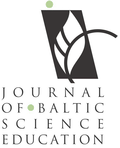ENVIRONMENTAL IMPACT ON LEARNING OUTCOMES IN SCIENCE EDUCATION IN SLOVENIAN PRIMARY SCHOOLS THROUGH THE ANALYSIS OF MATERIAL WORK CONDITIONS
| Title | ENVIRONMENTAL IMPACT ON LEARNING OUTCOMES IN SCIENCE EDUCATION IN SLOVENIAN PRIMARY SCHOOLS THROUGH THE ANALYSIS OF MATERIAL WORK CONDITIONS |
| Publication Type | Journal Article |
| Year of Publication | 2013 |
| Authors | Smrečnik, ID, Fošnarič, S, Čagran, B |
| Journal | Journal of Baltic Science Education |
| Volume | 13 |
| Issue | 4 |
| Start Page | 535–543 |
| Pagination | Continuous |
| Date Published | August/2013 |
| Type of Article | Original article |
| ISSN | 1648-3898 |
| Other Numbers | ICID: 1119983 |
| Keywords | environmental impact, material conditions, primary school |
| Abstract | The study deals with material support for practical work in science classes in Slovenian primary schools (grades 1-5). It answers the question of why there are differences in national tests in terms of socioeconomic development of the environment, despite the fact that schools are equally well equipped. There are two groups of teachers: in less-developed regions (N=337) and in more-developed regions (N=160) – the criterion is the “the development risk index.” Material research equipment in Slovenian schools is poor. Socioeconomic development does not affect the perception of problems such as: the lack of materials and equipment, oversized groups, poor spatial conditions, and the absence of an assistant. Equipment is provided by schools, while material is brought by the pupils themselves. Comparison has shown that students in more developed environments bring their own material more frequently, which enables more research activities. It was concluded that despite the fact that the material conditions in all Slovenian schools are similar, there are differences in the development level of inquiry skills. In more-developed regions, students compensate the lack of material by providing aids from their home environment. |
| URL | http://oaji.net/articles/2015/987-1447523813.pdf |
| DOI | 10.33225/jbse/14.13.535 |
| Refereed Designation | Refereed |
| Full Text |
